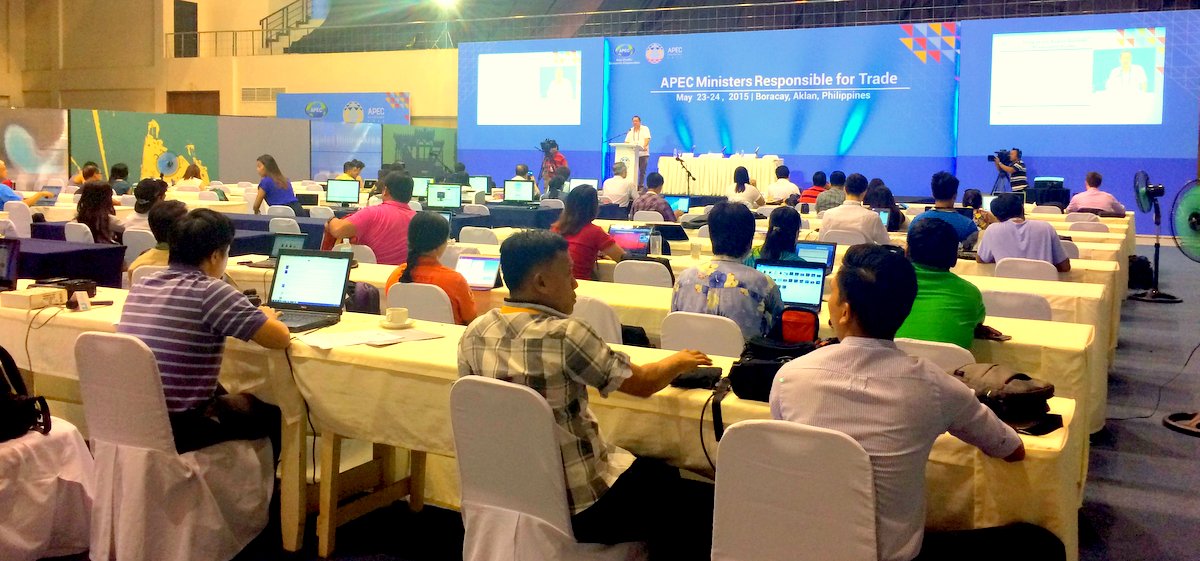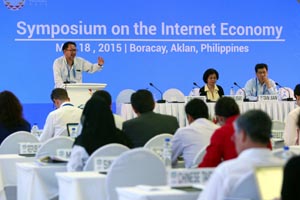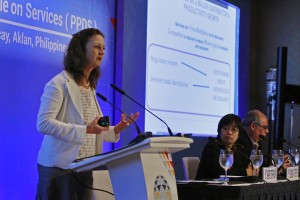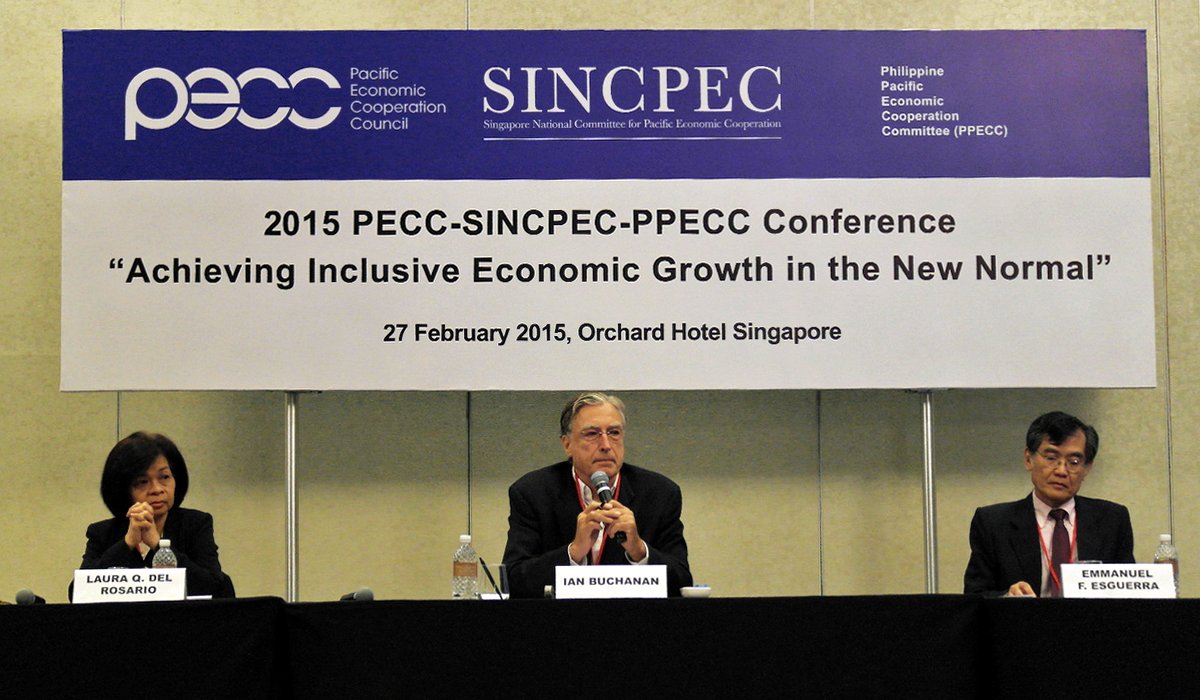| |
| |
|
In this issue:
PAST EVENTS
|
|
 Regional trade ministers gathering in Boracay for APEC should make improving the access of small companies to compete in global markets a top priority. In a survey conducted by the Pacific Economic Cooperation Council (PECC), 52 percent of respondents rated the facilitation of small and medium enterprises (SMEs) in global value chains as a top 5 priority for APEC, followed by the achievements of the Bogor Goals and the Free Trade Area of the Asia-Pacific (FTAAP); services sector reforms and liberalization; the design of trade policy in response to global value chains; and how economies can move to upgrade their participation in global value chains. Regional trade ministers gathering in Boracay for APEC should make improving the access of small companies to compete in global markets a top priority. In a survey conducted by the Pacific Economic Cooperation Council (PECC), 52 percent of respondents rated the facilitation of small and medium enterprises (SMEs) in global value chains as a top 5 priority for APEC, followed by the achievements of the Bogor Goals and the Free Trade Area of the Asia-Pacific (FTAAP); services sector reforms and liberalization; the design of trade policy in response to global value chains; and how economies can move to upgrade their participation in global value chains.
‘The emphasis on the role of global value chains reflects the changing nature of how international trade takes place,” said Mr. Eduardo Pedrosa, Secretary General of the PECC. “Being an effective exporter also requires being an efficient importer, having high barriers to trade is the worst thing an economy can do if it wants to benefit from trade. Parts move from one place to another before final assembly and reaching the consumer - small trade costs are magnified by the number of times the parts move.”
While trade growth is expected to remain below levels before the global financial crisis, the policy community does expect growth to be stronger over the next 5 years. Export grew by 4.6 percent in 2013 and slightly slowed to 4.5 percent in 2014 while expectations for 2016 through 2017 are at 5.2 percent.
More policy reforms are needed to help especially small companies enter the global market directly and enter global values chains. This includes simplifying compliance with the rules of origin.
About 40 media representatives attended the press briefing that consisted of a presentation by PECC Secretary General Eduardo Pedrosa on the survey results followed by a Q&A session where Mr. Pedrosa was joined by Ambassador Antonio Basiliio, Chair of Philippine committee for PECC/ Head of Delegation for APEC 2015 MRT; and Ambassador Tan Guoqiang, Chair of Chinese committee for PECC. Over 300 opinion leaders from the region's government, business, and research/ media sectors contributed to the survey during 7 to 28 April.
Download the full report: State of Trade in the Region 2015
Recording of the press briefing (YouTube)
Press Release: Need to improve SME access to international trade to promote inclusive growth (PDF)
News clippings
|
|
|
|
 The internet now accounts directly for upwards of 3.4 percent of GDP in many economies. About half of this comes from e-commerce and an additional 30 percent from investments in information technology infrastructure by private firms. The importance of the internet to the broader economy is set to increase in the coming years as more firms integrate technology into their business operations, and as diverse communications tools become more interconnected across most aspects of work and society. As highlighted during the PECC Singapore Conference 2015, the internet economy cuts across multiple sectors posing difficulties for effective policy-making domestically let alone internationally. In 2014, APEC Leaders formally recognized the role of the internet economy in promoting innovative development and empowering economic participation of individuals and SMMEs (small, medium and micro enterprises) as much as for MNCs (multinational companies). They instructed Ministers and officials to discuss the internet economy further, promote member economies' cooperation on developing the internet economy, and facilitate technological and policy exchanges to bridge the digital divide. APEC Ministers agreed to establish an Ad Hoc Steering Group to discuss such issues, propose action, and encourage collaboration across multiple APEC fora by endorsing the APEC Initiative of Cooperation to Promote Internet Economy. The internet now accounts directly for upwards of 3.4 percent of GDP in many economies. About half of this comes from e-commerce and an additional 30 percent from investments in information technology infrastructure by private firms. The importance of the internet to the broader economy is set to increase in the coming years as more firms integrate technology into their business operations, and as diverse communications tools become more interconnected across most aspects of work and society. As highlighted during the PECC Singapore Conference 2015, the internet economy cuts across multiple sectors posing difficulties for effective policy-making domestically let alone internationally. In 2014, APEC Leaders formally recognized the role of the internet economy in promoting innovative development and empowering economic participation of individuals and SMMEs (small, medium and micro enterprises) as much as for MNCs (multinational companies). They instructed Ministers and officials to discuss the internet economy further, promote member economies' cooperation on developing the internet economy, and facilitate technological and policy exchanges to bridge the digital divide. APEC Ministers agreed to establish an Ad Hoc Steering Group to discuss such issues, propose action, and encourage collaboration across multiple APEC fora by endorsing the APEC Initiative of Cooperation to Promote Internet Economy.
With the aim of supporting this initiative, PECC, in cooperation with the Philippines as the APEC chair for 2015, co-organizied a “Symposium on the Internet Economy” on May 18th, 2015 in Boracay, Philippines, during the week of annual APEC trade ministers' meeting.
The Symposium brought together APEC senior officials, representatives from internet economy-related businesses and relevant organizations to build on the multistakeholder dialogues underway since last year. The cross-cutting and borderless nature of the internet economy and ways to coordinate its socio-economic implications across different sectors and ministries of APEC were addressed.
Watch the keynote speech by APEC 2015 SOM Chair Laura Del Rosario and Session One (YouTube)
Program agenda with presentations for download
Summary Report for APEC SOM2
News clippings
ICT for inclusive growth in agriculture highlighted at APEC 2015 Symposium on internet economy (PIA)
Photos from the Symposium (courtesy of APEC 2015 Philippines)
Press Release: Opportunities from the Internet Economy for Inclusive Growth
20 May 2015 (Boracay, Philippines) - The Internet economy is increasingly important in providing jobs and opportunities across the Asia-Pacific region according to a symposium held on Monday with policy experts, entrepreneurs and government officials as part of the APEC meetings held in the Philippines. E-commerce, for example, was worth US$1.2 trillion in 2013, growing at a rate of around 20 percent every year. “Connectivity, through the Internet economy, will help bring SMEs to market, improve education and health services delivery, link small farmers to large markets, and change the way we design, create, and consume products and services, among others. No business sector or segment of society will be untouched by the power and potential of connectivity,’ said Ambassador Laura Del Rosario, APEC SOM Chair 2015. More...
|
|
|
 PECC co-organized a Public-Private Dialogue (PPD) on Services with the APEC Business Advisory Council (ABAC) of the Philippines in Boracay, Philippines on May 17th, just ahead of the annual APEC ministerial meeting for trade. The purpose of this dialogue was to deepen understanding of officials on the challenges faced by service providers in the region and contribute to the issues to be included in an APEC Services Cooperation Framework, a major initiative of the Philippines this year as the APEC chair. PECC co-organized a Public-Private Dialogue (PPD) on Services with the APEC Business Advisory Council (ABAC) of the Philippines in Boracay, Philippines on May 17th, just ahead of the annual APEC ministerial meeting for trade. The purpose of this dialogue was to deepen understanding of officials on the challenges faced by service providers in the region and contribute to the issues to be included in an APEC Services Cooperation Framework, a major initiative of the Philippines this year as the APEC chair.
The approach taken in this series of Public-Private Dialogues is to understand how companies operate their value chains in the region – some of this involves analytical work as well as hearing directly from service providers.
PPD on Services that took place in Clark, Philippines in February 2015 on the margins of the First Senior Officials' Meeting (SOM1) of APEC, covered information technology and business process management (IT-BPM), creative industries, and reserach and development services. The Boracay PPD was a follow-up to focus on services relevant to the manufacturing, agriculture and environment-related sectors.
Program agenda with presentations for download
Services can lead to inclusive growth, experts say (PIA)
ABAC Chair: Open trade, investment regime in services to boost growth, jobs in APEC economies (PIA)
APEC Public Private Dialogue on Services features manufacturing, agriculture, and environment- related services (PIA)
 The Singapore National Committee for Pacific Economic Cooperation (SINCPEC) and the Philippine Pacific Economic Cooperation Committee (PPECC) were the co-organizers of annual Singapore PECC conference, "Achieving Inclusive Economic Growth in the New Normal," in support of APEC 2015 chaired by the Philippines. The Singapore National Committee for Pacific Economic Cooperation (SINCPEC) and the Philippine Pacific Economic Cooperation Committee (PPECC) were the co-organizers of annual Singapore PECC conference, "Achieving Inclusive Economic Growth in the New Normal," in support of APEC 2015 chaired by the Philippines.
During the APEC Leaders’ Meeting held in Beijing in November 2014, key decisions were taken to make progress on key elements of the regional agenda, including on a Free Trade Area of the Asia-Pacific (FTAAP) and improving connectivity. The challenge is how regional economies can implement these plans to ensure that regional growth is not only sustainable but also inclusive.
The conference addressed the following themes through five plenary sessions:
1) Asia-Pacific Economic Cooperation in a Changing Global Context: Risks and Opportunities
2) Inclusive Growth: Building Capacity at Individual and Community Levels
3) Connectivity and Regional Economic Integration: Reaping the Benefits of Economic Integration
4) Financing Inclusive Growth
5) Making Regional Economic Integration More Inclusive
Laura Del Rosario, Chair of APEC Senior Officials' Meeting (SOM) 2015, and Emmanuel Esguerra, Deputy Director-General of Philippine National Economic and Development Authority delivered the opening speeches. Other speakers and panellists included:
• Roberto Tan, Treasurer of the Philippines;
• Arsenio Balisacan, Philippine Secretary of Socioeconomic Planning;
• Joey Salceda, Governor of Albay, Philippines;
• Narongchai Akrasanee, Thai Minister of Energy;
• Mari Pangestu, former Minister of Trade/ former Minister of Tourism and Creative Economy, Indonesia;
• Il-houng Lee, President of Korea Institute for International Economic Policy (KIEP); and
• Tan Sri Rastam Mohd Isa, Chairman, Institute of Strategic and International Studies (ISIS), Malaysia.
Program agenda and presentations for download
MEMBER UPDATES
FPTPEC held its annual general meeting in Paris chaired by its President, Mr. Michel Rochard. About 50 individuals from business, academic, and government sectors participated. Apart from presentations on the ongoing projects of PECC and the new project on ports and shipping proposed by FPTPEC ("The Blue Economy, Future of Port Management and Shipping in the Asia-Pacific"), two presentations were delivered by: Ambassador Christian Lechervy, Permanent Secretary for the Pacific in regards to security in the Asia-Pacific, and the other by Mr. Olivier Barrat, who is in charge of Oceania at the Ministry of Foreign Affairs, on economic cooperation and commercial objectives of the French diplomatic activities in the Asia-Pacific. More...
|
|
|
|
|
|
| |
| |
| |
| |
|
|
| |
UPCOMING EVENTS
|
| |
PECC General Meeting | Manila, Philippines | September 10-12, 2015
The Blue Economy: Future of port management and shipping in the Asia-Pacific (Seminar 1) | Papeete, French Polynesia | October 19-20, 2015
|
|
| |
APEC RELATED
|
|
| |
PECC Statement to APEC Ministers Responsible for Trade (MRT)
PECC Update to APEC SOM2
Photos and videos from Boracay, Philippines - APEC SOM2, MRT and Related Meetings
|
|
| |
PECC IN THE NEWS
|
|
| |
Talent and knowledge are 'key to success for countries today'
Business Times
11 June 2015
Lianhe Zaobao (Singapore)
11 June 2015
The Online Citizen (Singapore)
11 June 2015
Channel NewsAsia
10 June 2015
Rappler
24 May 2015
Philippine Star
23 May 2015
Philippine Daily Inquirer
19 May 2015
FTSE Global Markets
19 May 2015
Xinhua News
19 May 2015
ENorth Netnews
19 May 2015
Tianjin Daily
19 May 2015
The Visayan Daily Star
18 May 2015
Manila Times
5 May 2015
Embassy News
4 March 2015
CNBC
27 Feb 2015
Philippine Star
12 Feb 2015
Jakarta Post
10 Feb 2015
ABS_CBN
7 Feb 2015
Tempo
6 Feb 2015
Manila Standard Standard
1 Feb 2015
Philippine Daily Inquirer
31 Jan 2015
Literární Noviny (Czech)
23 Jan 2015
|
|
| |
DISCUSSION FORUM
|
|
| |
Malcolm Cook
Senior Fellow, Institute of Southeast Asian Studies (ISEAS)
APEC leaders’ tightening embrace of the Free Trade Area of the Asia Pacific proposal first floated by the APEC Business Advisory Council in 2004 offers APEC a unique opportunity for renewal and strengthening through expansion.
In 2010, APEC leaders ordered APEC to become “an incubator of an FTAAP by providing leadership and intellectual input into the process of its development” with the guiding principle that FTAAP should build on existing regional trade liberalization processes involving APEC members. (http://www.apec.org/Meeting-Papers/Leaders-Declarations/2010/2010_aelm.aspx).
These are the so-called pathways to an FTAAP. In 2014, FTAAP became the centrepiece of an APEC leaders meeting for the first time with leaders committing to “launch a collective strategic study on issues related to the realization of the FTAAP” that is scheduled for leaders consideration at APEC 2016. (http://www.apec.org/Meeting-Papers/Leaders-Declarations/2014/2014_aelm.aspx).
More...
***
Christopher Findlay
Executive Dean of the Faculty of the Professions at the University of Adelaide
Vice-Chair of AUSPECC
There is strong evidence that businesses are doing things differently. Production processes are being organized into a series of value adding steps in different locations, organized in what is being referred to as Global Value Chains. These chains offer new opportunities for developing economies to enter global markets, and provide options for adjustment to economies at later stages of developing undergoing structural change. They offer finer options for capturing the benefits of differences in competitiveness in production process and better growth prospects as a result.
Data from the ADB shows over the period 1995 to 2008 that, while the rate varies a lot, the participation in GVCs in nearly every Asian economy increased. An exception was Hong Kong, whose position remained stable, having already developed a sophisticated system of production and distribution. Participation measures here refer to the extent to which imported inputs are used in local production and to which outputs are inputs into production elsewhere. The phenomenon is relevant to goods production but also applies in services. More...
|
|
| |
JOB VACANCY
|
|
| |
The APEC Policy Support Unit is receiving job applications to fill the opening of a researcher at entry-level. Applicants must be a citizen of one of the 21 APEC economies. Your application must include a cover letter and a resume detailing your qualifications and experience. Previous applicants need not apply. Interested candidates who are meticulous, motivated and analytical should send their applications to albh@apec.org no later than 3 July 2015. Please refer to the relevant website for more information about this position.
|
|
|
|
|
| |
|
|
|
|





